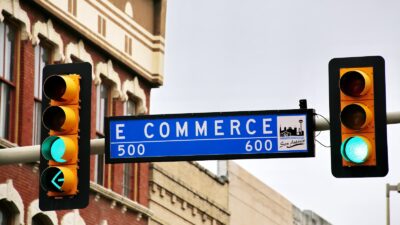Navigating the Complexities of Traditional E-commerce in the Metaverse
Understanding the Shift from Traditional E-commerce to the Metaverse
Integrating traditional e-commerce models in the metaverse presents both significant challenges and exciting opportunities for businesses worldwide. The shift from traditional e-commerce to a metaverse-based model is not merely a technological transition but also a fundamental change in how businesses and consumers interact. This evolution is particularly relevant in rapidly growing digital economies like those of Saudi Arabia and the UAE, where innovation drives economic expansion.
Traditional e-commerce relies on familiar platforms and processes, such as online storefronts, shopping carts, and payment gateways. However, the metaverse introduces a more immersive and interactive shopping experience. In the metaverse, consumers can explore virtual stores, interact with products in a 3D environment, and engage with brands in entirely new ways. This shift demands businesses to rethink their strategies, adopt new technologies, and develop a deeper understanding of virtual consumer behavior.
Technological and Infrastructure Challenges
One of the primary challenges in integrating traditional e-commerce models into the metaverse is the need for advanced technology and robust infrastructure. The metaverse requires high computational power, seamless connectivity, and sophisticated virtual reality (VR) and augmented reality (AR) capabilities. For regions like Riyadh and Dubai, which are investing heavily in smart city initiatives and digital transformation, building the necessary infrastructure is a critical step towards supporting metaverse-based commerce.
Additionally, businesses must navigate the complexities of integrating existing e-commerce platforms with new metaverse technologies. This integration involves ensuring compatibility, maintaining data security, and providing a seamless user experience across different digital environments. Overcoming these challenges requires substantial investment in technology, skilled personnel, and ongoing innovation to stay ahead in a competitive market.
Consumer Behavior and Market Adaptation
Understanding and adapting to new consumer behaviors is another significant challenge. In the metaverse, consumers expect more personalized, interactive, and engaging shopping experiences. Traditional e-commerce models, which focus on convenience and efficiency, must evolve to meet these new expectations. This evolution involves leveraging technologies like artificial intelligence (AI) and generative AI to create personalized shopping experiences, anticipate consumer needs, and enhance customer engagement.
For businesses in Saudi Arabia and the UAE, where consumer markets are diverse and tech-savvy, adapting to these changes is crucial. Companies need to invest in market research, understand local consumer preferences, and develop strategies that resonate with their target audience. By doing so, they can effectively bridge the gap between traditional e-commerce and metaverse commerce, creating a seamless and satisfying shopping experience for their customers.
Exploring the Opportunities of Metaverse Commerce
Enhanced Consumer Engagement and Brand Loyalty
One of the most significant opportunities of integrating traditional e-commerce models in the metaverse is the potential for enhanced consumer engagement and brand loyalty. The immersive nature of the metaverse allows businesses to create unique and memorable shopping experiences that go beyond transactional interactions. Brands can build virtual showrooms, host interactive events, and provide personalized customer service in a way that fosters deeper connections with their audience.
In regions like Riyadh and Dubai, where consumer markets are dynamic and competitive, creating strong brand loyalty is essential. By leveraging the capabilities of the metaverse, businesses can differentiate themselves from competitors, build stronger relationships with their customers, and drive long-term loyalty. This approach not only enhances customer satisfaction but also increases the likelihood of repeat business and positive word-of-mouth referrals.
New Revenue Streams and Business Models
The metaverse also opens up new revenue streams and business models that were not possible in traditional e-commerce. Virtual goods, NFTs (non-fungible tokens), and virtual real estate are just a few examples of the new economic opportunities within the metaverse. Businesses can monetize these virtual assets, offering consumers unique and exclusive products that enhance their virtual experiences.
For entrepreneurs and mid-level managers in Saudi Arabia and the UAE, exploring these new revenue streams can lead to significant business growth. By staying ahead of emerging trends and investing in innovative business models, companies can capitalize on the economic potential of the metaverse. This proactive approach not only drives profitability but also positions businesses as leaders in the digital economy.
Global Reach and Market Expansion
The global nature of the metaverse presents a unique opportunity for businesses to expand their reach beyond traditional geographic boundaries. In the metaverse, virtual storefronts and experiences can attract consumers from around the world, providing businesses with access to a global customer base. This expansion is particularly beneficial for companies in regions like Riyadh and Dubai, where international trade and commerce are vital components of economic growth.
By leveraging the metaverse, businesses can tap into new markets, reach diverse audiences, and increase their brand visibility on a global scale. This global reach not only drives sales but also enhances brand recognition and reputation, further solidifying a company’s position in the international market. For business executives and entrepreneurs, understanding and harnessing the power of the metaverse is crucial for future success.
Conclusion
Integrating traditional e-commerce models within the metaverse presents a blend of challenges and opportunities for businesses. While the technological and behavioral shifts required are significant, the potential benefits in terms of consumer engagement, new revenue streams, and global reach are substantial. For regions like Saudi Arabia and the UAE, embracing these changes can drive economic growth and innovation, positioning them as leaders in the digital economy. By navigating the complexities and capitalizing on the opportunities, businesses can thrive in the evolving landscape of metaverse commerce.
—
#metaverse #ecommerce #virtualcurrency #SaudiArabia #UAE #Riyadh #Dubai #digitaltransformation #businessinnovation #blockchain #AI























